The Murder of John Lennon
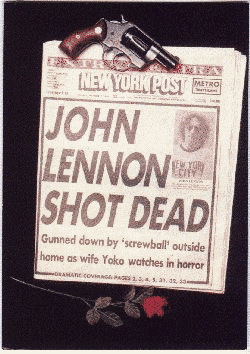 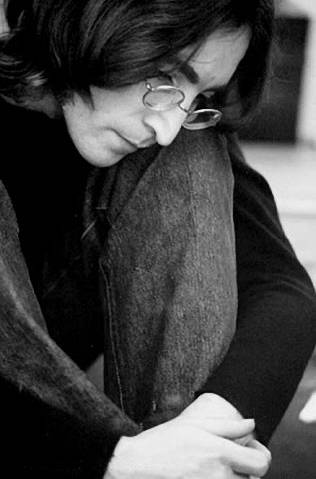
"Even Lennon’s childhood hero, Elvis, didn’t
trust him. During his visit to the White House on December 21, 1970,
Presley told President Nixon that he was concerned for the youth of
America, and feared that they had been seduced to drugs and immorality
by the “filthy, unkempt appearance and suggestive music of the
Beatles.” He was unhappy that the Beatles were taking so much money
out of America and back to England. Presley referred to them as
“anti-American” accused them of saying “anti-American stuff when
they got back [to England]."
EX-BEATLE LENNON SLAIN
[From The Chicago Tribune, Tuesday, December 9, 1980]
NEW YORK--John Lennon, the driving force behind
the legendary Beatles rock group, was shot to death late Monday as he
entered his luxury apartment building on Manhattan's Upper West Side.
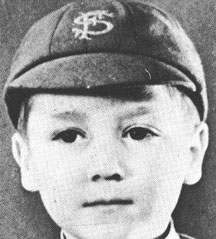 Lennon,
40, one of the most prolific songwriters of the century, was rushed in a
police car to St. Luke's-Roosevelt Hospital Center, where he died
shortly after arrival. Lennon,
40, one of the most prolific songwriters of the century, was rushed in a
police car to St. Luke's-Roosevelt Hospital Center, where he died
shortly after arrival.
Police said Lennon was shot outside the Dakota, the
century-old apartment house where he and his wife, Yoko Ono, lived
across the street from Central Park.
New York Chief of Detectives James D. Sullivan
identified the alleged assailant as Mark David Chapman, 25, of 55 S.
Kukui St., Hawaii.
Sullivan said Chapman arrived in New York City about a
week ago and stayed at several YMCAs before checking into the Sheraton
Center Hotel in midtown< Manhattan. Chapman was seen at the Dakota on
Saturday and Sunday, asking about Lennon, Sullivan said. Chapman was
there again Monday afternoon when Lennon and Ono left their apartment
about 5 p.m. to go to a recording session, Sullivan said. Chapman
stopped Lennon and got an autograph on a record album, the chief said.
When Lennon and Ono returned shortly before 11 p.m. New
York time, they left their limousine at the curb and walked up the
driveway toward the courtyard. Chapman came up behind them and called
out, "Mr. Lennon," Sullivan said.
As Lennon started to turn, Chapman went into a combat
stance, and emptied a Charter Arms .38 revolver, which contained five
bullets, Sullivan said.
Lennon staggered up six steps into the vestibule and
said, "I'm shot," before collapsing on the floor, Sullivan
said.
Chapman was standing there when policemen arrived,
Sullivan said. He had dropped the gun, and an elevator man had recovered
it, Sullivan said.
Sullivan said that Chapman had bought the gun in Hawaii
and the detective didn't know how he got it to New York. Chapman has
given no motive, according to Sullivan, who refused to say whether he
had confessed.
Chapman was charged with homicide and is to be arraigned
Tuesday morning.
[This story was compiled from reports filed by three
Tribune reporters--Michael Coakley, Carol Oppenheim, and Barbara
Brotman--who rushed to the scene of the slaying of former Beatle John
Lennon, to the hospital, and to New York police headquarters immediately
after the shooting. It was written by Sallie Gaines.]
[From the Detroit Free Press, Tuesday, Dec. 9, 1980]
LENNON: A BRILLIANT MADMAN
by Joe Urschel
The Beatles were really the creative marriage of two
men: Paul McCartney and John Lennon.
McCartney was the softener, the musician, the pop-brain
who understood the musical marketplace. Lennon was McCartney's manic
alter ego - the cynical wit, the brillant madman.
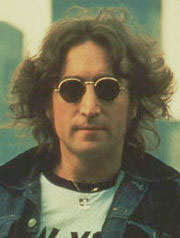 After
the break-up of the band 10 years ago, McCartney became just another pop
musician. Lennon became an eccentric recluse, married to an equally
enigmatic Japanese-American artist, Yoko Ono. After
the break-up of the band 10 years ago, McCartney became just another pop
musician. Lennon became an eccentric recluse, married to an equally
enigmatic Japanese-American artist, Yoko Ono.
He was killed Monday just as he was re-emerging onto the
music scene after a five-year silence. He and Ono had just released a
collaborative album, "Double Fantasy."
The Beatles came out of the lower middle class in
Liverpool, England, during a period of social confrontation among
England's youth. The times produced warring cliques of Mods, foppish
intellectual sorts, and Rockers, leather-clad bikers.
Lennon was once asked which group the Beatles belonged
to. His reply: "Neither, we're mockers."
It was his sarcasm and scorn that gave the Beatles their
anti- establishment tag. Ringo Starr was the bemused child, George
Harrison the lonely introvert and McCartney the shrewd conservative.
Lennon's songs, such as "I Am the Lawless,"
"A Day in the Life" and "Strawberry Fields Forever,"
were wanderings through existential uninviting worlds. They told of
depression, angst and bizarre discovery. He played the inspired crazy
jester to the pop-sensibility of McCartney, whose songs were often slick
and frothy, such as "Yesterday" and "When I'm 64."
When the two worked together, however, legendary music
was made.
Lennon led the band members through most of their
experiments with the bizarre and metaphysical. His fascination with
Eastern religion promoted the Beatles to take up study with the
Maharishi Mahesh Yogi and helped spur the fascination with
Transcendental Meditation in the mid-'70s.
Recently, however, Lennon had given up most of his
attachments to organizations and religions. Asked recently about Bob
Dylan's conversion to Christianity, Lennon replied, "I'm not
pushing Buddhism because I'm no more a Buddhist than a Christian. But
there's one thing I admire about the religion. There's not
proselytizing."
Lennon was always willing to poke fun at himself and
others. At one of the Beatles early concerts, he instructed those in the
"cheap seats" to clap, then added, "The rest of you can
rattle your jewelry."
WHAT PEOPLE HAD TO SAY ABOUT JOHN'S DEATH
Julia Baird (John's Sister)
"I had not seen John for years, but when he died it
was like having an arm cut off. I can't explain my feelings, even to
myself. During the following week I avoided the radio & television,
although I could manage newspapers. They weren't as emotionally
demanding as a voice or picture going over John's life or, even worse, a
re-run of an interview with John looking out from the television as if
he was really still there. As for listening to any of his records, the
very thought made me wince with pain."
Bob Batz Jr. (Dayton Daily News)
"When Lennon died, I lost a friend I've never met,
a friend I've never talked to, a friend I've never seen in person, but a
friend nevertheless."
Sid Bernstein
"John Lennon was brilliant, so gifted, so giving.
He was the Bach, Beethoven, the Rachmaninoff of our time."
Chuck Berry
"Since the time they had one of their first hits
with Roll Over Beethoven, I've always felt very close to the Beatles. I
fell as if I lost a little part of myself when John died."
Roy Cicala
"John used to joke around a lot. The funniest
incident I remember occurred when I was an engineer on Mind Games at the
record plant. John had taken the finished tapes of the album into the
cutting room. When I walked in, loose tape was piled all over the place;
John was sitting there with this sad face. I went out to the elevator, I
guess to count to 100 or something, and John came running out. It had
been a joke, and the tape all over the room was blank."
Donovan
"Here's a nice story that comes to mind concerning
my time with the Beatles. It was 1968 in India, we were all gathered
together in the Maharishi's bungalow, four Beatles, one Beach Boy, Mia
Farrow and me. Maharishi was on the floor sitting cross-legged, but the
rest of us were all still standing around as we'd just arrived. Anyway
there was a kind of embarrassed hush in the room and John Lennon (always
the funny one) decided to break the silence so he walked up to the
Maharishi, patted him on the head and quietly said, 'There's a good
guru.' John certainly had a wicked tongue all right, but he was honest
to a fault. Therefore, many people often considered him to be very hard
and forward. Actually, that's how he protected his sensitivities, by
saying exactly what he felt. As far as I'm concerned, he ranks up there
with Kennedy, Martin Luther King and Gandhi as a figure for peace in the
world."
Bob Dylan
"John and the Beatles were doing things nobody was
doing. Their cords were outrageous, and their harmonies made it all
valid. Everybody else thought they were for the teeny boppers, that they
were gonna pass right away. But it was obvious to me that they had
staying power: I knew they were pointing in the direction where music
had to go."
George Harrison
"After all we went through together I had and still
have great love and respect for him. I am shocked and stunned. To rob
life is ultimate robbery. This perpetual encroachment on other people's
space is taken to the limit with the use of a gun. It is an outrage that
people can take other people's lives when they obviously haven't got
their own lives in order."
Nick Hopkins
"The first time I worked with John was in 1968,
when I played electric piano on Revolution. He was real pleased with the
way things went and told me there'd be a lot more sessions he'd be
inviting me to. But I didn't see him again until 1971, at his home in
Ascot, where he was recording Imagine. I reminded him of his comment and
asked why I hadn't been invited to any more sessions. "Well
Nick," he said, "we thought you were to involved with the
Stones, and we were afraid to ask." If only I'd known that was the
reason! Later that year, John and Yoko invited my wife and me to his
birthday party. It was in Syracuse, New York, where Yoko's "This is
not Here" art exhibition was being held, and John flew us there and
back to California. He gave everybody silver zodiac necklaces, even
though it was his birthday."
Mick Jagger
"I liked John a lot. He was the one I really got on
with the most. We weren't buddy-buddies but we were always friendly. But
after the Beatles and the Stones stopped playing clubs, we didn't see
each other that much until he separated from Yoko, around 1974. We got
really friendly again. And when he went back with Yoko, he went into
hibernation ... when I went to visit someone in the Dakota, I'd leave
him a note saying: 'I live next door: I know you don't want to see
anyone, but if you do, please call.' He never did."
Edward Koch
"John Lennon profoundly affected a generation. His
music and that of the Beatles was worldwide in import. Every death by
violence is a trauma to society. The death of someone of John Lennon's
stature intensifies this trauma. We mourn his loss."
Leila (John's Cousin)
"Our poor long lost little cousin. At work he was a
Beatle but at home always, always a brother. Our dear Judy's finally got
him back at last."
Cynthia Lennon
"I would like to say how terribly upset we are at
the sudden death of John Lennon. I have always had the deepest affection
for John since the divorce and have always encouraged his relationship
with Julian, which I thought was best. It came so suddenly. Julian
remained very close to his father in recent years and is hoping to
follow a career in music. He was looking to his father for guidance.
Julian was hoping to see his father shortly."
Sean Lennon
"Now Daddy is part of God. I guess when you die you
become bigger, a part of everything."
Yoko Ono Lennon
"... the only way you can better John is by copying
him exactly."
Paul McCartney
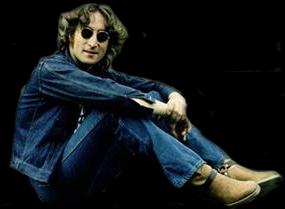 "I have hidden my self in work today. But it keeps flashing in my
mind. I feel shattered, angry and very sad. It's just ridiculous. He was
pretty rude about me sometimes, but I secretly admired him for it, and I
always managed to stay in touch with him. There was no question that we
weren't friends, I really loved the guy. I think that what has happened
will in years to come make people realize that John was an international
statesman. He often looked a loony to many people. He made enemies, but
he was fantastic. He was a warm man who cared a lot and with the record
Give Peace A Chance helped stop the Vietnam War. He made a lot of
sense."
"I have hidden my self in work today. But it keeps flashing in my
mind. I feel shattered, angry and very sad. It's just ridiculous. He was
pretty rude about me sometimes, but I secretly admired him for it, and I
always managed to stay in touch with him. There was no question that we
weren't friends, I really loved the guy. I think that what has happened
will in years to come make people realize that John was an international
statesman. He often looked a loony to many people. He made enemies, but
he was fantastic. He was a warm man who cared a lot and with the record
Give Peace A Chance helped stop the Vietnam War. He made a lot of
sense."
Norman Mailer
"We have lost a genius of the spirit."
Gerry Marsden
"First up John was always a good friend. He was
never the abusive, aggressive guy some people made him out to be. When
John was killed I think he was just hitting his peak, both as an artist
and a human being. And that's the saddest thing of all isn't it? John's
death."
Richard Perry
"I can remember very distinctly every minute I
spent in the studio with John; it was probably the greatest thrill of my
career. He had amazing energy and electricity. He worked at a fast pace,
and it spread to everyone else. He loved the record-making process as
much as anyone in the business, and whenever he was in the studio, he
was smiling."
Smokey Robinson
"Forty is an early age to have to leave this
planet, but as a performer, the way Lennon was killed is very
frightening and tragic to me. He was truly one of the world's greatest
musical innovators and I'm sure he'll be missed and mourned by many,
especially those of us who are his peers."
Tommy Roe
"Chris Montez and I were headlining a tour of
England and Scotland in 1963 and the Beatles were at the bottom of the
bill, but they soon became the stars. It was a 30 day bus tour, all
one-nighters. My first record, Sheila, was a hit in '62 but I had no
real experience as a performer, while the Beatles had a lot of stage
experience but no hit. When I met John, he told me the group used to
sing Sheila at the Star Club in Hamburg, and I thought he was kidding
until the "Live" album came out years later and Sheila was on
it. He was inquisitive about the States, asking about my hometown,
Atlanta, and everywhere else. He was a bundle of energy, always talking,
always clowning. I have a photo of him backstage during the tour, and
he's coming at me with his hands up like a claw, his glasses on
crooked."
Andy Rooney
"Almost everyone who becomes famous ends up acting
the way famous people act. It isn't so much that famous people want to
act that way; they are forced into certain patterns of behavior. John
Lennon was trying to act some way other than the way famous people act
and people wouldn't let him."
Ethan Russell
"I first encountered John in England during the Let
It Be period, when I took a bunch of pictures of him and Yoko in a
basement. Being only twenty-one and an amateur; I overexposed the
photos, but I got great pictures of Yoko. They liked them so much they
asked me to take more, and I was surprised that someone of his stature
would overlook my mistakes and give me another chance. Years later, I
sent John some videotapes to show him what I had been up to and he asked
me to shoot a promotion film for (Just Like) Starting Over that Yoko
would direct and produce. Once, while we were shooting in Central Park,
he laughed and said, 'This reminds me of Rubber Soul, only my face has
fallen.' "
Graham Russell
"John was one of the handful of true rock poets and
his lyrics always bore the stamp of his unique mind. Listening to them
now they seem unbearably poignant, full of other meanings now that he
has gone."
Frank Sinatra
"It was a staggering moment when I first heard the
news. Lennon was a most talented man and above all, a gentle soul. John
and his colleagues set a high standard by which contemporary music
continues to be measured."
James Taylor
"I had a couple of conversations with John during
the recording of the 'White Album' and I remember him being very busy
and devoted to his craft. I watched him work on the two or three
versions of Revolution and he was really intense. He believed very
passionately about what he wrote. It was obvious that the song was a
response to people making demands on him concerning his radical point of
views, and you realized that by adulation of the group, we were making
it more difficult for them to continue."
Harold Wilson
"John Lennon's death was a great tragedy. What the
Beatles were doing for kids was taking them off the streets and giving
them a new interest in life."
Bill Wyman
"I first met John in March 1963, when the Beatles
came down to see the Stones play in this dingy club called the Station
Hotel in Richmond. They stood in line in their little leather coats and
later came back to the flat; we stayed up all night talking about music
and became good friends. John knew where he was going, and was very
strong; he really got it together: Very determined."
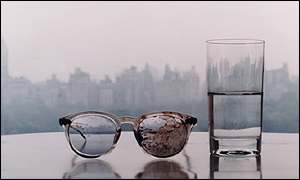

|